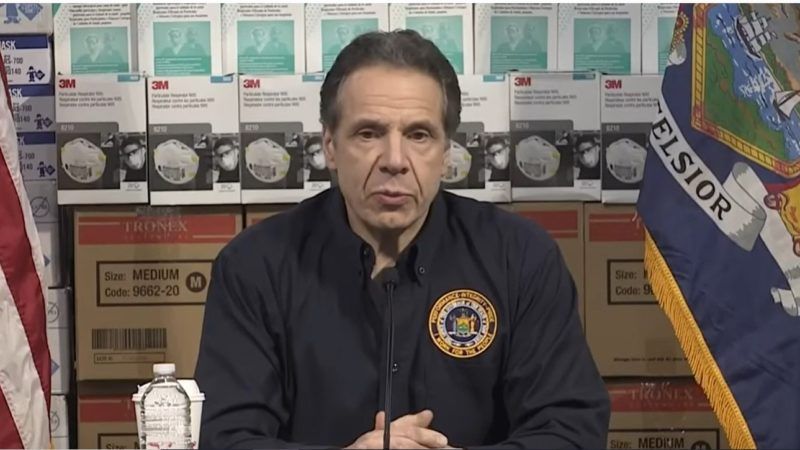Andrew Cuomo's Morally Grotesque Rationale for Maintaining COVID-19 Lockdowns
Even the president is a better moral philosopher than New York's governor.

New York Gov. Andrew Cuomo continues to show that he cannot be trusted to properly weigh the costs and benefits of COVID-19 lockdowns. While conceding the unavoidable tradeoff between lives and livelihoods, he insists that preventing even one death is worth any amount of economic pain.
"The faster we reopen," Cuomo told reporters this week, "the lower the economic cost, but the higher the human cost, because the more lives lost. That, my friends, is the decision we are really making."
Cuomo misleadingly implies that the economic burden of lockdowns—lost jobs, shuttered businesses, a precipitous drop in spending and output, unemployment at a level not seen since the Great Depression, tens of millions of Americans struggling to pay their bills and feed their children—is not a "human cost." Who is hurt by this suppression of economic activity? Robots? Policy makers should be trying to balance the interests of vulnerable people on both sides of this equation: medically vulnerable people who are especially likely to die if they get COVID-19 and economically vulnerable people who can't afford to sit on their couches and watch TV all day.
At least Cuomo said "the decision we are really making" involves accepting more infections, and therefore more deaths, as the cost of relieving some of this suffering. That will no doubt be true as legal restrictions on movement and work are relaxed, even as we try to minimize that cost through less sweeping social distancing measures, including both voluntary actions and more carefully targeted regulations.
But then Cuomo took it all back. "How much is a human life worth?" he asked. "That is the real discussion that no one is admitting, openly or freely. That we should. To me, I say the cost of a human life, a human life is priceless. Period."
Although Cuomo thinks "no one is admitting" that decisions about COVID-19 control measures require putting a value on human life (either implicitly or explicitly), some of us have been raising that point for months. Maybe that value should be in the neighborhood of $10 million—a figure often used to assess the cost-effectiveness of health and safety regulations, derived from the extra pay that people demand for risky jobs. Maybe the value should be adjusted based on how many years someone can be expected to live. But even if you think $10 million is too low or reject the idea of taking into account life-years as well as lives, the value cannot be infinite, as Cuomo has been insisting since March. "A human life is priceless" may sound like a nice sentiment, but its moral implications are grotesque. It requires us to ignore any amount of suffering that's not reflected in mortality statistics, as long as the policy that inflicts it can be expected to prolong even one person's life.
That is not the way regulatory agencies usually make decisions. If it were, the government would not only have to radically rethink speed limits; it would have to seriously contemplate abolishing cars altogether. It would have to insist on zero pollution emissions, no matter how much achieving that goal would cost in terms of productivity and living standards. It would have to ban all risky activities that kill even a handful of people each year, regardless of how much enjoyment or utility they provide.
Policies like these, of course, might lead to deaths from other causes, just as measures aimed at mitigating the impact of COVID-19—such as bans on potentially lifesaving "elective" surgery, or recession-inducing lockdowns that could drive up the suicide rate—might kill some people in an effort to save others. But if we take Cuomo at his word, the relevant consideration is the net impact on mortality and nothing else, no matter how many people are affected or how much they value the things they are forced to sacrifice.
That position is not just impractical but immoral. Even people who have qualms about a consistently applied utilitarianism should be willing to concede that there is something fundamentally wrong with Cuomo's approach, which implies that postponing one person's death by a few years is worth throwing millions of others out of work.
Even Donald Trump, for all his manifest failings, seems to be a better moral philosopher than Cuomo. Yesterday a reporter posed this question to the president: "It seems [there is] little question that, by beginning the reopening process and continuing it, there will likely be more cases of coronavirus, more deaths than there would have been had everything stayed shut down. Will the nation just have to accept the idea that, by reopening, there will be more cases, there will be more deaths?" Trump conceded that "it could very well be the case," although he alluded to precautions aimed at limiting the impact on people who are elderly or have serious preexisting medical conditions. Then he added: "We have to get our country open again….People want to go back. You're going to have a problem if you don't do it. If you don't do it, you've got a very big problem."
Trump's critics no doubt will portray that formulation as the crass elevation of mere economic concerns above "human life," which Cuomo informs us is "priceless." But economic concerns—the voluntary transactions through which people not only support themselves and their families but find pleasure and meaning—are also very much about human life. Pretending otherwise can only lead to policies that impoverish all of us in the vain hope of creating a world without risk.
